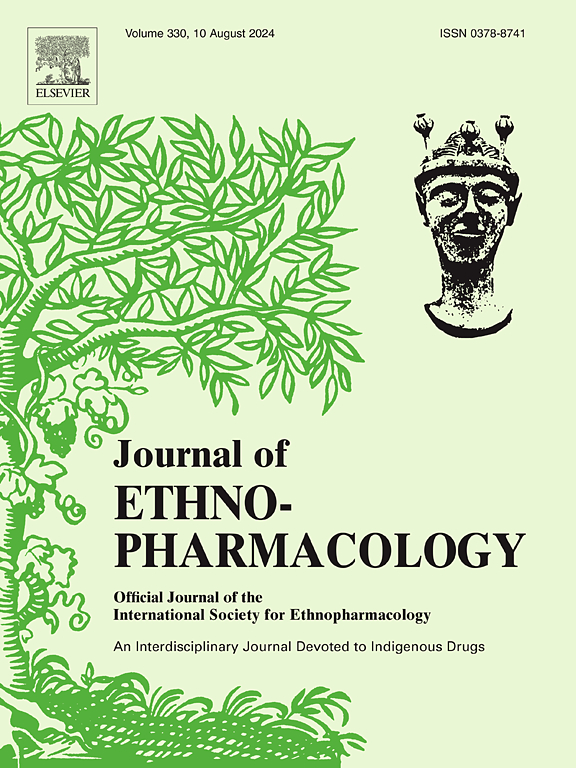洋河汤抑制炎症诱导的结直肠癌肺转移。
IF 4.8
2区 医学
Q1 CHEMISTRY, MEDICINAL
引用次数: 0
摘要
民族药理学相关性:阳性缺乏和癌毒性是结直肠癌(CRC)肺转移的主要发病机制。养和汤(YHD)是一种中药,具有温阳、补血、散寒、清滞的功效,采用正邪结合的治疗方法,抗肿瘤疗效显著。然而,其抑制结直肠癌肺转移的确切机制尚不清楚。研究目的:本研究旨在阐明YHD在结直肠癌肺转移中的抗肿瘤作用。材料与方法:采用超高效液相色谱-质谱联用技术(UHPLC-MS)对YHD进行化学成分分析。通过量化肺转移结节,在结直肠癌肺转移小鼠模型中评估YHD的抗癌活性。采用CCK-8法、流式细胞术和Transwell法评估YHD对结直肠癌细胞增殖、凋亡、细胞周期进展和侵袭的影响。通过分析外周血和肿瘤组织中的抗肿瘤免疫、免疫抑制细胞和细胞因子,评估yhd介导的荷瘤小鼠免疫调节。进行肠道菌群分析以确定YHD对小鼠肠道菌群的影响。结果:我们的分析鉴定了1801个YHD化学标记物。CFA加重了CRC的肺转移,而口服YHD显著减轻了这一作用,CRC荷瘤小鼠转移性肺结节数量减少证明了这一点。体外实验表明,YHD可抑制结直肠癌细胞增殖,诱导凋亡,抑制侵袭。在经CFA治疗的结直肠癌转移小鼠肺组织中,NK细胞和IL-21明显减少,M2巨噬细胞和IL-6明显增加。YHD治疗后,肺组织中NK细胞和IL-21明显升高,M2巨噬细胞和IL-6减少。服用YHD还与有益细菌种类(如芽孢杆菌)的增加和有害细菌种类(如振荡杆菌)的减少有关。结论:我们的研究结果表明,除了调节肿瘤微环境以促进抗肿瘤免疫外,YHD还通过抑制结直肠癌细胞的增殖和侵袭来抑制结直肠癌的肺转移。这些结果为临床应用YHD治疗结直肠癌患者提供了科学依据。本文章由计算机程序翻译,如有差异,请以英文原文为准。

Yanghe decoction inhibits inflammation-induced lung metastasis of colorectal cancer
Ethnopharmacological relevance
Positive deficiency and cancer toxicity are the main pathogenesis of colorectal cancer (CRC) lung metastasis. Yanghe decoction (YHD), a traditional Chinese medicine, has the effects of warming yang, tonifying blood, dispersing cold and clearing stagnation, adopting a treatment method that combines supporting the right and dispelling the wrong, which has remarkable efficacy in anti-tumor.Although, its precise mechanism of inhibiting the metastasis of colorectal cancer to the lung is still poorly understood.
Aim of the study
This study aimed to elucidate the antitumor properties of YHD within the context of colorectal cancer lung metastasis.
Materials and methods
Ultrahigh-performance liquid chromatography coupled with mass spectrometry (UHPLC-MS) was utilized to analyze the chemical composition of YHD. The anticancer activity of YHD was evaluated in a CRC lung metastasis mouse model by quantifying pulmonary metastatic nodules. The effects of YHD on CRC cell proliferation, apoptosis, cell cycle progression, and invasion were assessed using CCK-8 assays, flow cytometry, and Transwell assays. YHD-mediated immune modulation in tumor-bearing mice was evaluated by analyzing antitumor immunity, immunosuppressive cells, and cytokines in peripheral blood and tumor tissue. Gut microbiota analysis was conducted to determine the impact of YHD on the gut microbiota in mice.
Results
Our analysis identified 1801 chemical markers in YHD. CFA exacerbated lung metastasis in CRC, whereas oral administration of YHD significantly mitigated this effect, as evidenced by the reduced number of metastatic lung nodules in CRC tumor-bearing mice. In vitro experiments demonstrated that YHD inhibits CRC cell proliferation, induces apoptosis, and suppresses invasion. In the lung tissues of mice with CRC metastasis treated with CFA, there was a significant reduction in NK cells and IL-21, along with an increase in M2 macrophages and IL-6. Following YHD treatment, there was a notable increase in NK cells and IL-21, accompanied by a decrease in M2 macrophages and IL-6 in lung tissues. YHD administration was also associated with an increase in beneficial bacterial species such as Bacillus and a decrease in deleterious bacterial species such as Oscillibacter.
Conclusion
Our findings demonstrate that YHD inhibits lung metastasis in CRC by suppressing CRC cell proliferation and invasion, in addition to modulating the tumor microenvironment to favor antitumor immunity. These results provide a scientific basis for the clinical application of YHD in the treatment of CRC patients.
求助全文
通过发布文献求助,成功后即可免费获取论文全文。
去求助
来源期刊

Journal of ethnopharmacology
医学-全科医学与补充医学
CiteScore
10.30
自引率
5.60%
发文量
967
审稿时长
77 days
期刊介绍:
The Journal of Ethnopharmacology is dedicated to the exchange of information and understandings about people''s use of plants, fungi, animals, microorganisms and minerals and their biological and pharmacological effects based on the principles established through international conventions. Early people confronted with illness and disease, discovered a wealth of useful therapeutic agents in the plant and animal kingdoms. The empirical knowledge of these medicinal substances and their toxic potential was passed on by oral tradition and sometimes recorded in herbals and other texts on materia medica. Many valuable drugs of today (e.g., atropine, ephedrine, tubocurarine, digoxin, reserpine) came into use through the study of indigenous remedies. Chemists continue to use plant-derived drugs (e.g., morphine, taxol, physostigmine, quinidine, emetine) as prototypes in their attempts to develop more effective and less toxic medicinals.
 求助内容:
求助内容: 应助结果提醒方式:
应助结果提醒方式:


